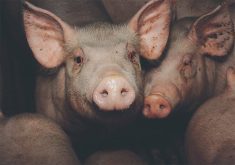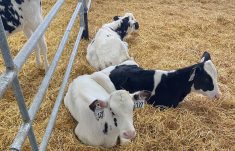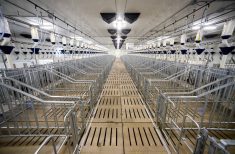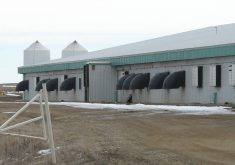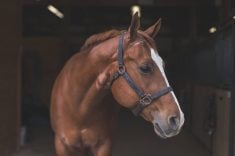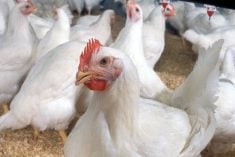It’s now illegal to ship a “downer” animal to sale or slaughter in Manitoba.
The Animal Care Amendment Act proclaimed last week prohibits the loading and transportation of animals not fit to travel.
The new law fills a gap created by the federal Health of Animals Act, which also prohibits transporting downers. That law only governs animals while in transit. Once an animal is off the truck, the Canadian Food Inspection Agency has no authority.
“What we’re doing is, we’re dovetailing with the CFIA regulations so that animals, when they’re on a truck, are governed under the CFIA rules and when they’re not on the truck, when they’re at an assembly point, they’re governed under provincial regulations,” said provincial veterinarian Dr. Wayne Lees.
Read Also

KAP flags risky trade for Manitoba farmers
Tariffs, market access uncertainty, trade diversification and export infrastructure top the agenda at Keystone Agricultural Producers (KAP) annual meeting.
The only exception to the rule is that downed animals may be transported to a veterinary clinic for treatment. But it depends on the situation, said Dr. Allan Preston, a Manitoba Agriculture, Food and Rural Initiatives assistant deputy minister.
A downer animal may be transported only if it can be loaded and unloaded humanely. A smaller animal, such as a calf or a foal, could be loaded and transported but a mature cow or horse could not, said Preston.
“There simply is no way to humanely load a 1,000-pound animal,” he said.
“The calf with a broken leg that cannot stand can be transported to the vet for treatment. The cow with a broken leg that cannot stand must either receive treatment on-farm, be slaughtered on-farm after a veterinary examination and the carcass taken to an abattoir for processing, or humanely euthanized and disposed of on the farm.”
The law also prohibits auction markets and stockyards from accepting commercial trade animals not fit to travel. Operators of such sites who report the arrival of unfit animals are protected from liability. So are veterinarians who report suspected cases of animal neglect or abuse.
Lees said the new rules were driven in part by several high-profile cases several years ago in which animals were received in poor condition, resold and put on trucks for reshipping.
“It’s more assurance for the public that animals are actually being looked after well,” he said.
“There’s growing public recognition that they want a more active role for government in terms of protecting animal welfare.”
Kurt Siemens, a Manitoba Egg Farmers director, said livestock producers support the new measures.
“We applaud the government for making these amendments to the act because it shows that it’s a societal thing to take care of animals,” said Siemens.
“Public perception is that animals need to be taken care of. And I would wholeheartedly agree.”
Bill McDonald, Winnipeg Humane Society CEO, said consolidation in the meat-packing industry increases the distance livestock must be hauled to slaughter and raises the risk of inhumane transport.
For that reason, society demands a high standard of care for transporting livestock, McDonald said.
“The abuses where people look the other way, it’s not going to happen any more.”
The new regulations also expand licensing regulations covering dog and cat breeders to include kennels, retail pet stores and breeders of companion animals. A breeder is someone with five or more intact females.
The government has increased maximum fines for offences to $10,000 from $5,000 for a first offence and to $20,000 from $10,000 for a second or subsequent offence. The maximum term for imprisonment increases to 12 months from six months for a second offence. Persons convicted of an offence can receive a lifetime ban from owning or caring for animals.
The chief veterinarian’s office has hired three additional staff, including a companion animal welfare veterinarian, an animal welfare investigator and an animal licensing co-ordinator. [email protected]
———
“We applaud the government for making
these amendments.”
– KURT SIEMENS, MEF


